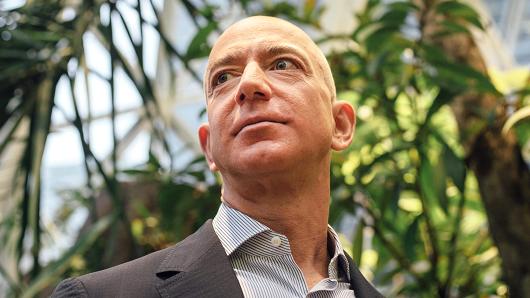
Amazon is getting into health care. That’s not speculation, at this point.
The company hasn’t spoken much about its plans, as it’s still determining the scope through a series of brainstorming sessions with experts in the space, but its hiring trends and recent product development hint strongly at where it could go.
So in the run-up to CNBC’s Healthy Returns conference, here’s a recap of what we know, what we don’t, and what the experts think about Amazon’s potential to disrupt the $3 trillion sector.
What we know
- The company is already selling medical supplies and equipment to clinics and hospitals, and it is looking to build out that business. As CNBC reported, Amazon forged key partnerships years ago with some of the largest U.S. distributors, like Cardinal Health, and it has applied for the necessary state-by-state licenses.
- Its cloud business, AWS, is pitching its services to health-care customers and competing head-on with Microsoft Azure and Alphabet’s Google Cloud. It recently put out a job listing for an employee to network with top health investors in a bid to build relationships with health start-ups early in their lifecycle.
- It is planning to take on the problem of rising employee health-benefits costs. The company announced a partnership with J.P. Morgan and Berkshire Hathaway to strategize how to rethink health care for their 1.2 million combined workers. The search for a CEO to lead that effort is still underway.
- Amazon sees the potential to bring voice technologies into the home, as well as the hospital and clinic. It has partnered with Merck for a “challenge” to inspire Alexa developers to create “skills” to help people with diabetes manage their condition. And that’s just the beginning. Hospitals across the country are experimenting with Alexafor things like helping surgeons create check lists or sharing vital important with patients once they get discharged. (Amazon has in the past declined to comment on these reports.)
What we don’t know but suspect
- Amazon is poised to do something big in the pharmacy space. It now has more than two-dozen people exploring opportunities, according to a recent report, which sources say is a separate initiative from its partnership with Berkshire Hathaway and J.P. Morgan (the drug supply chain is notoriously opaque, even for large employers).
- Amazon is positioning itself to shake up the experience of care and how it’s delivered. CNBC reported that it’s hired Martin Levine, one of the top physicians at an innovative primary care group called Iora health, and it secretly convened a meeting with some of the top thinkers in the space.
- Amazon Vice President Babak Parviz has spent a good deal of time thinking about the problem of aging, specifically on how technology can help. In a rare public appearance, he spoke at a conference about loneliness, despite the rise in technologies designed for the home. Presumably, Alexa could help with that, although it would need to be redesigned to appeal to an older demographic.
- Amazon is making inroads with the largest medical records companies, which is vitally important for efforts that make use of clinical data. This could indicate potential plans like making recommendations to physicians around drug pricing and quality, at the point of care.
What the experts think
Well, it depends on whom you ask. Those in health care have a tendency to be skeptical, given that technology companies have tried before and failed. But former senior Amazon employees told CNBC that this view is short-sighted, and that the health-care industry should get prepared.
Here’s a snapshot of some of the divergent views across the industry:
- Two former Amazon execs who now work in health care told CNBC that there isn’t much that the company would be “afraid” to do. Health care might be highly regulated, and complicated, but that wouldn’t stop a company that once set an agenda to digitize every book in print. “Every industry has thought that Amazon wouldn’t disrupt them,” said Curtis Kopf, an ex-director at Amazon who now works as a senior vice president at Premera Blue Cross.
- Some health executives believe that Amazon won’t do much, as it learns about the complexities. As Walgreens’ CEO Stefano Pessina stressed on a recent earnings call with investors, Amazon has “opportunities around the world and in other categories, which are much, much simpler than health care, which is a very regulated business.”
- What’s realistic is that Amazon will at least attempt to get into health care on multiple fronts, and it will be more successful in some areas than in others. The hiring points to a broad strategy, as it now has experts from biopharma, primary care, health insurance and other sectors, on the payroll.
- Whatever Amazon does, expect that it will have some impact on the consumer. Health care today treats its patients and consumers with a “one sized fits all” approach, rather than as individuals with divergent needs. As Morgan Reed, president of a nonprofit group called ACT, The App Association — which represents software developers — put it, Amazon could help the industry “move from ‘one treatment for all’ to treatment and medication just for you.”
